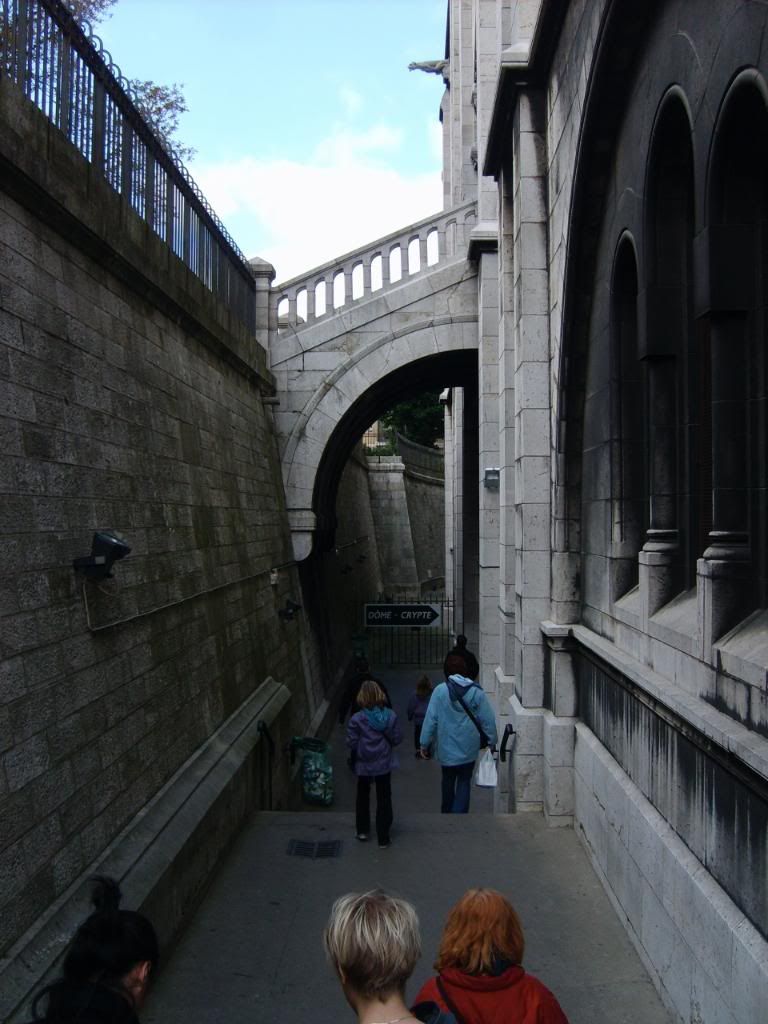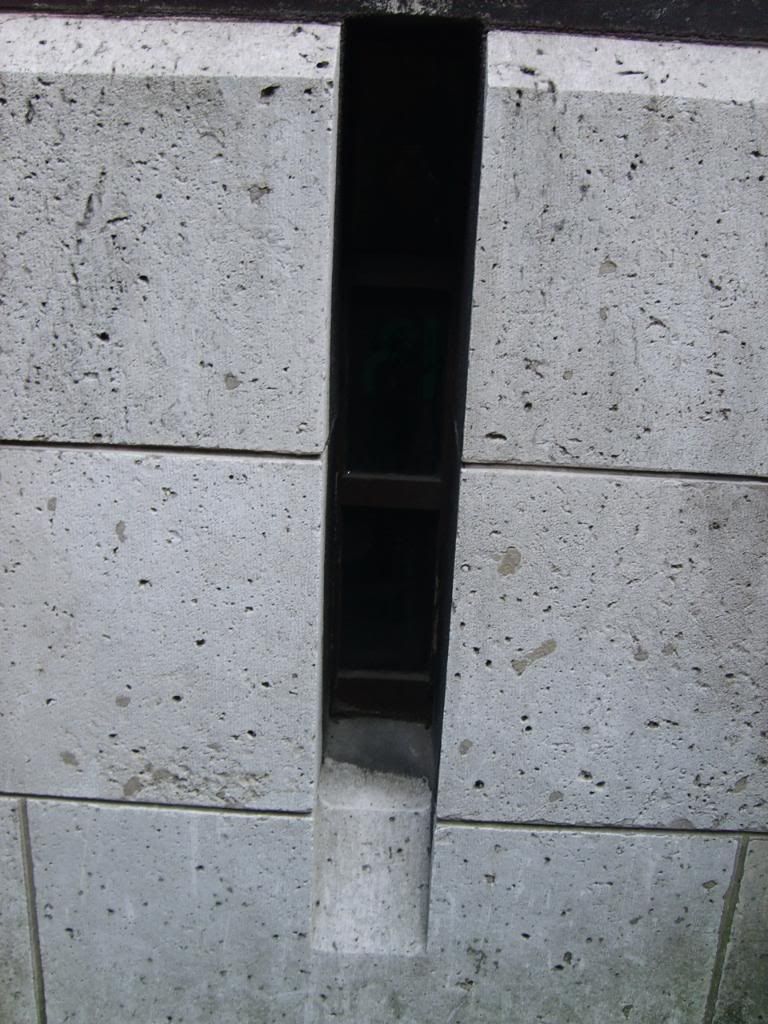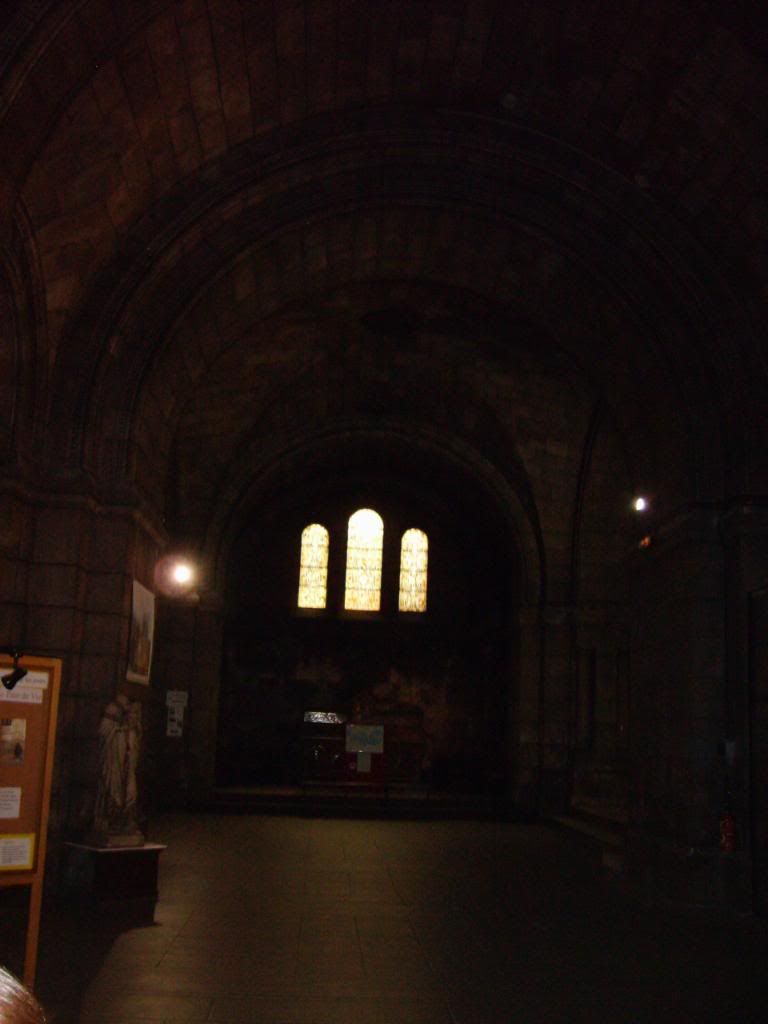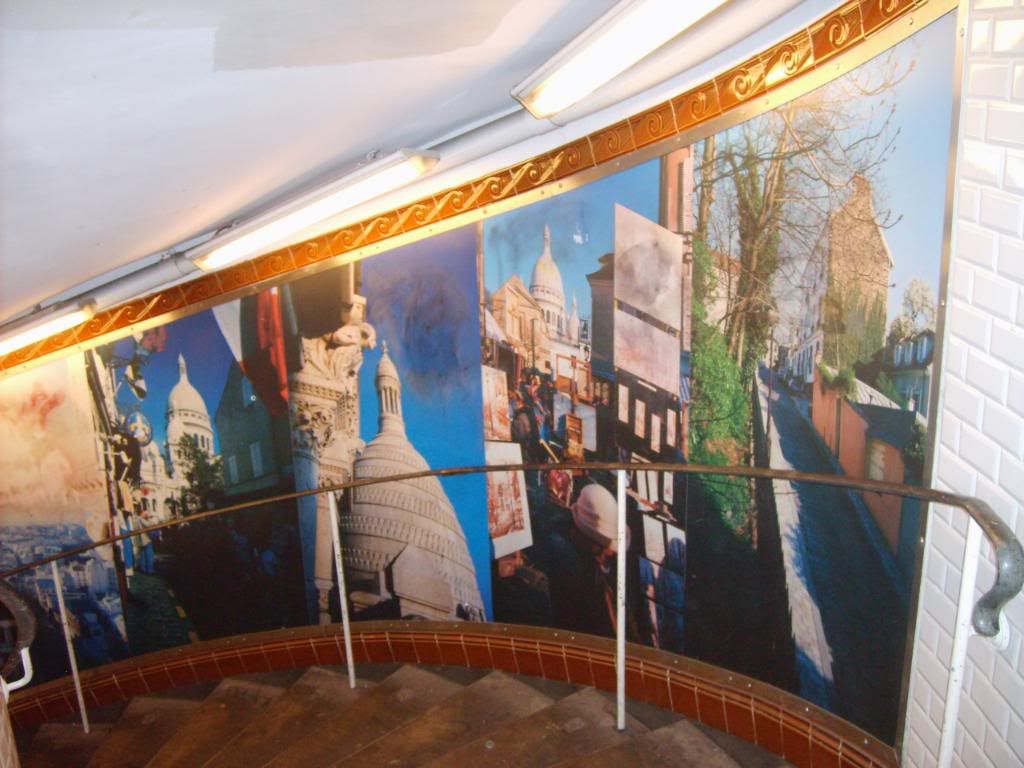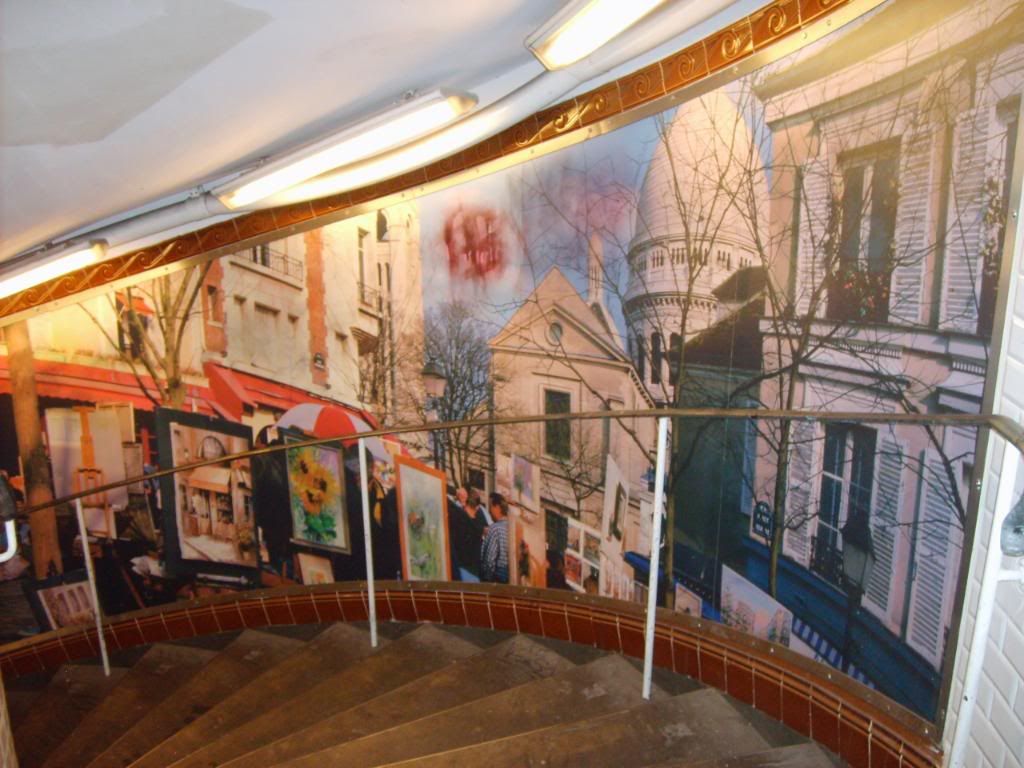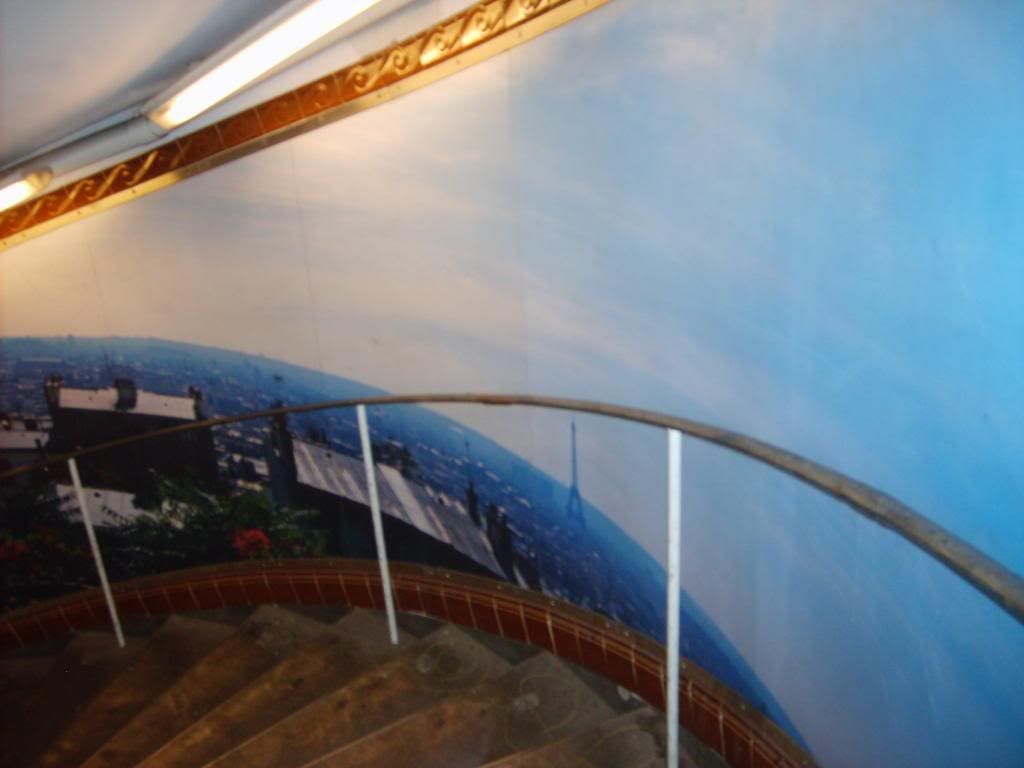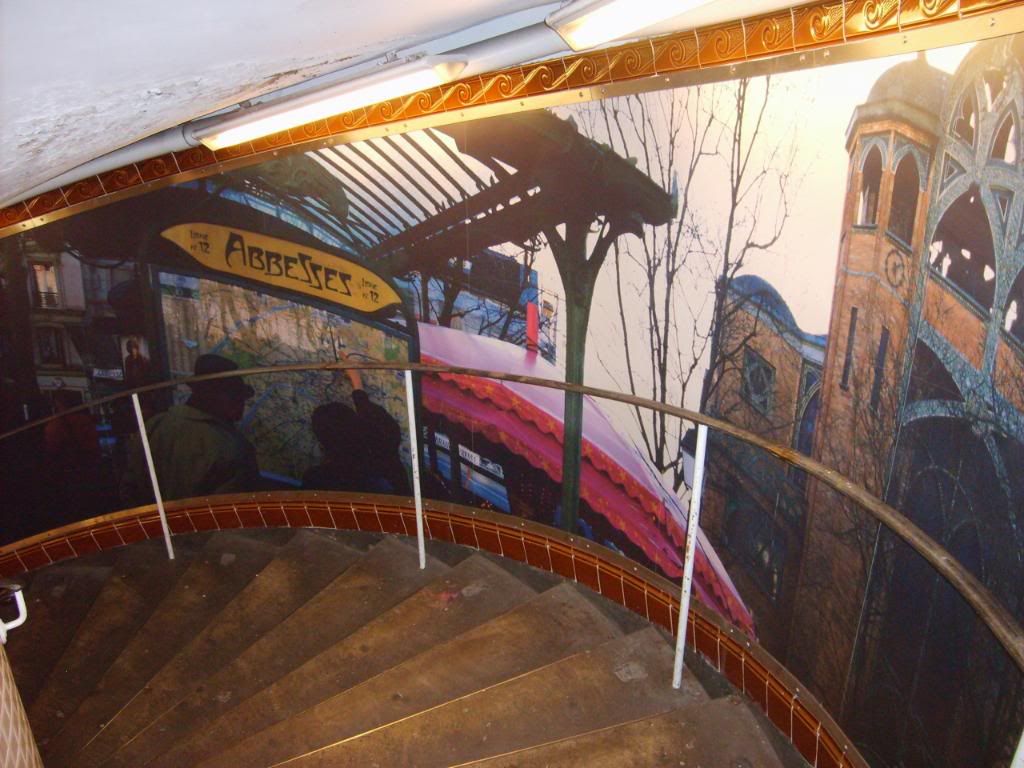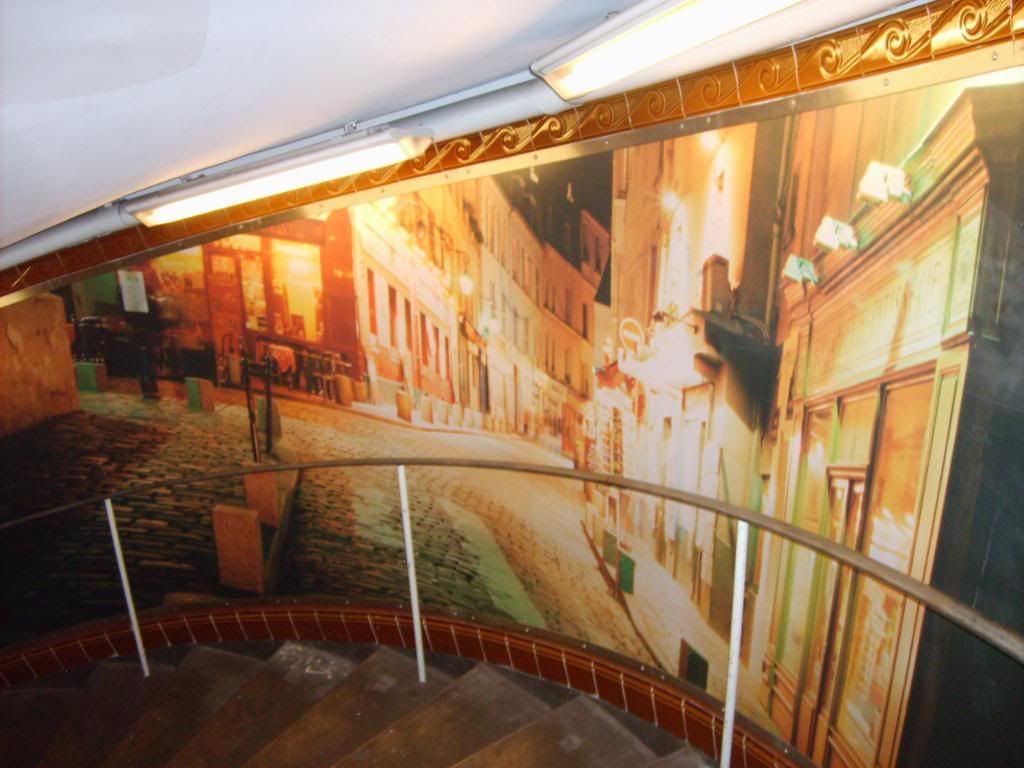More pictures! …and, oops, another rant
I said I’d have pictures of the inside of the church, didn’t I? Here we go! First, a helpful sign at the entrance. I kinda misunderestimated when to take the picture as I was walking by following the professor, but the cut-off letters can be deduced with relative ease, I hope.
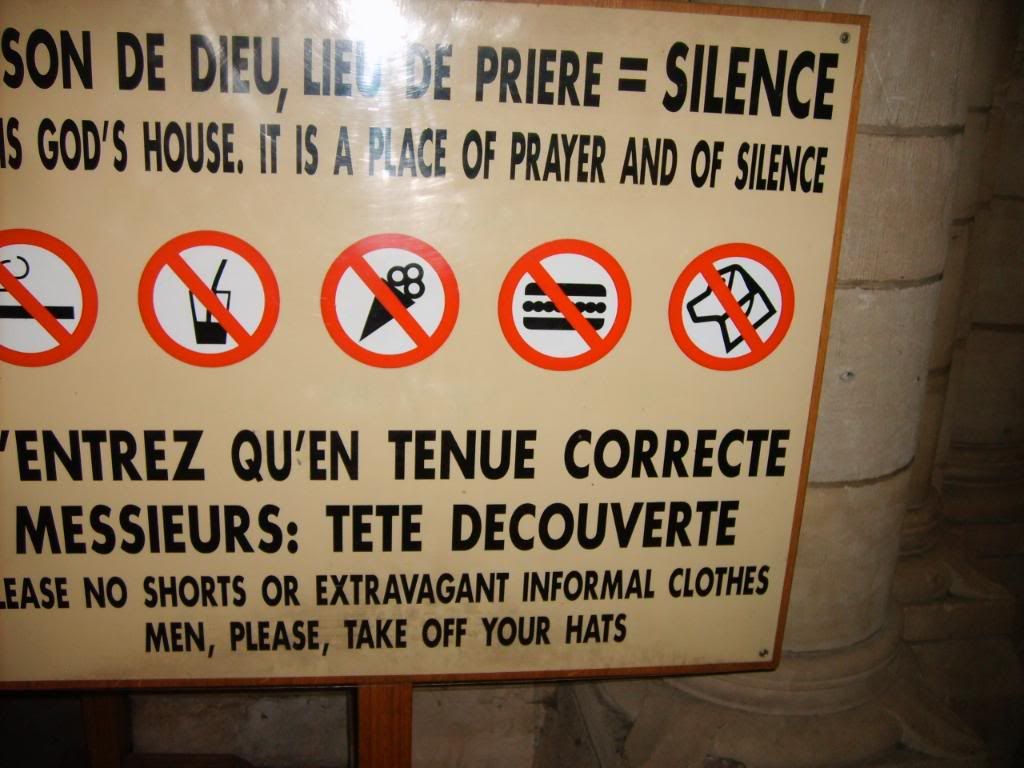
Nice old wooden statue of St. Vincent, whom I of course associate with St. Vincent’s hospital in the Village, but who’s apparently also the patron saint of vintners:
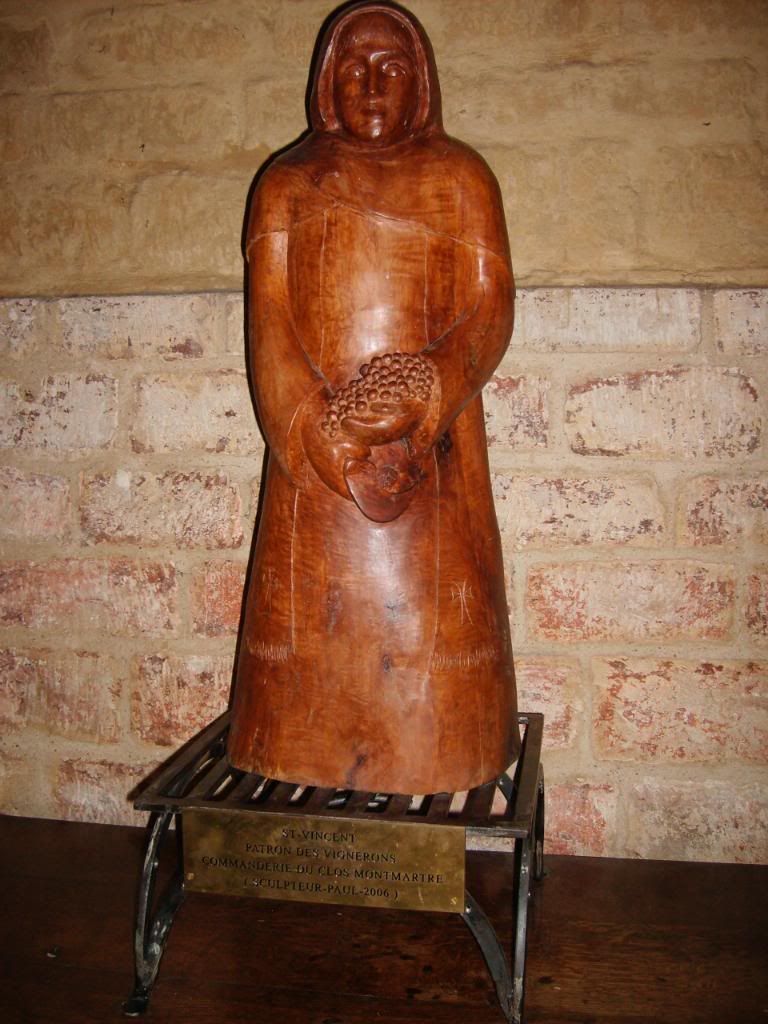
Inside the chapel in the crypt place. A statue of some cardinal, I believe, presenting Sacré Coeur to Paris. It’s symbolic, see? Either that, or it means he had a hobby of making model buildings of which he was very proud.
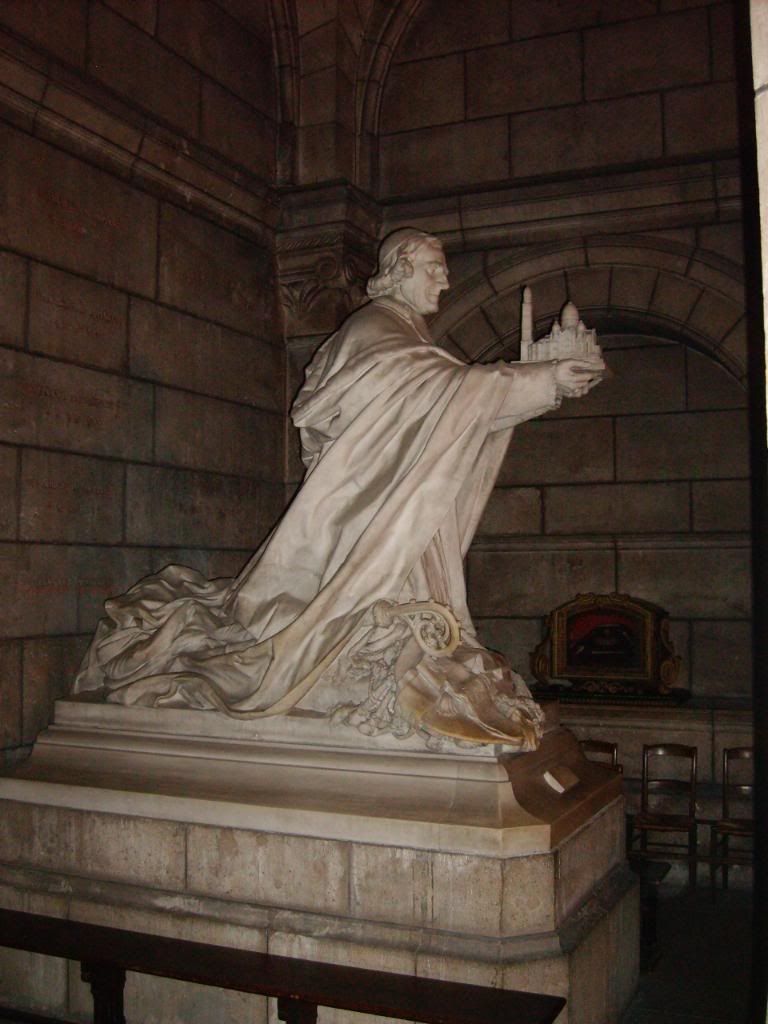
Same room, different stone guy. More bishop-y, in this case.
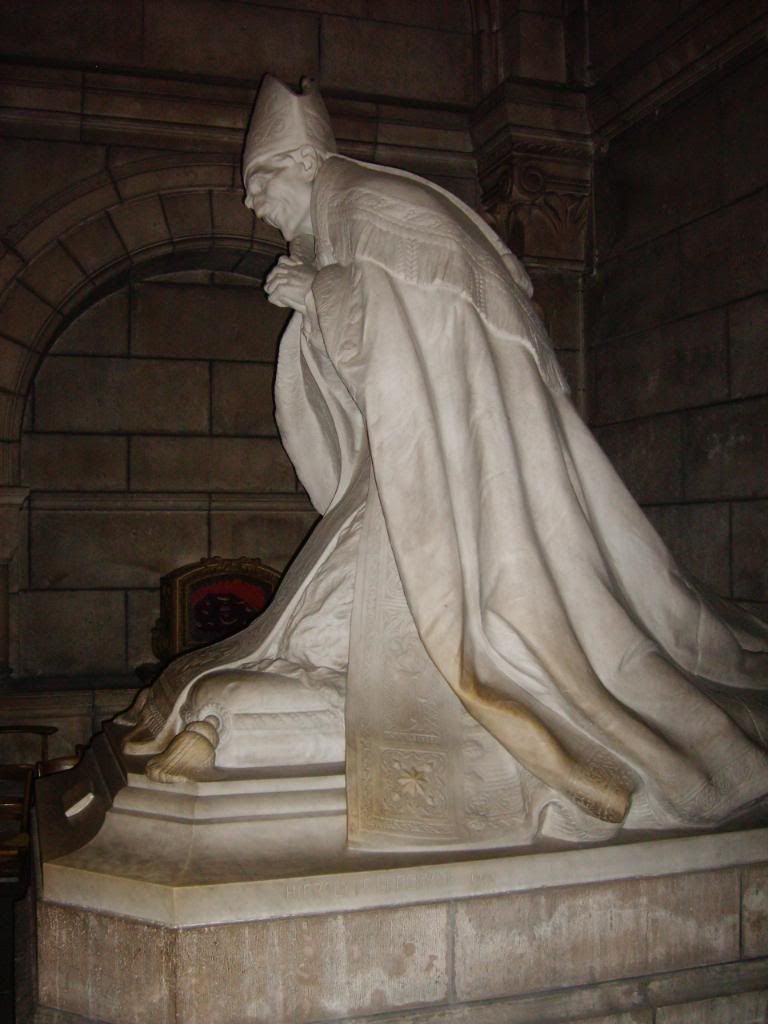
St. Denis, after whom the town and university are named. It seems that this fellow made quite a stir after he was decapitated by the Romans, when he proceeded to pick up his head and walk a good long way to the current site of St. Denis. [insert your own joke about how he could keep his head in tough situation, how he helped the church get ahead, etc… then there was the time he tripped on his journey and dropped his head, he was quite beside himself… ]
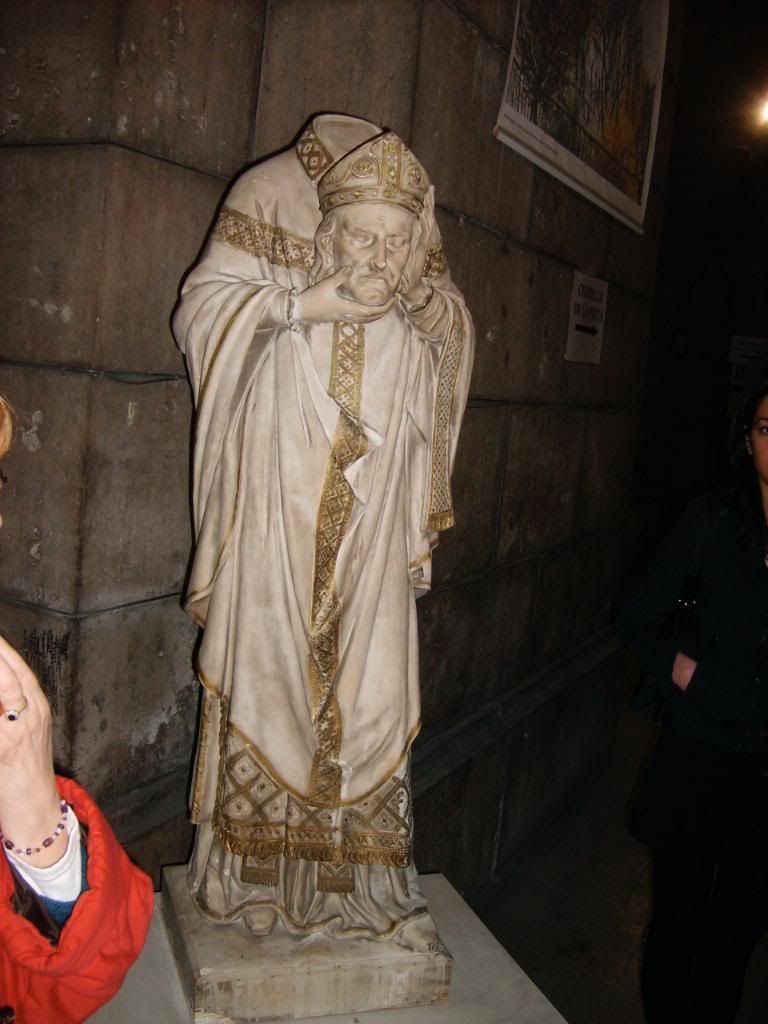
Didn’t take pictures inside Sacré Coeur, because the nice helpful sign there asked us not to. There is a very nice mosaic there, with all sorts of saints, including St. Denis, who gets one halo around his head and one around his neck. Some nice stained-glass windows, from the fifties, in pseudo-medieval style. And some statues, including one of St. Michael killing that dragon, as he’s wont to do. Or at least I assume it was St. Michael. The only other obvious contender would be George, and as he’s the patron saint of England, you know, I wouldn’t expect the French to be overly fond of him, what with several hundred years of military history between the countries.
Yesterday I had to get to the Place des Abbesses, which was a lovely opportunity to photograph the artwork in the stairwell at the subway station. Saw another helpful sign:
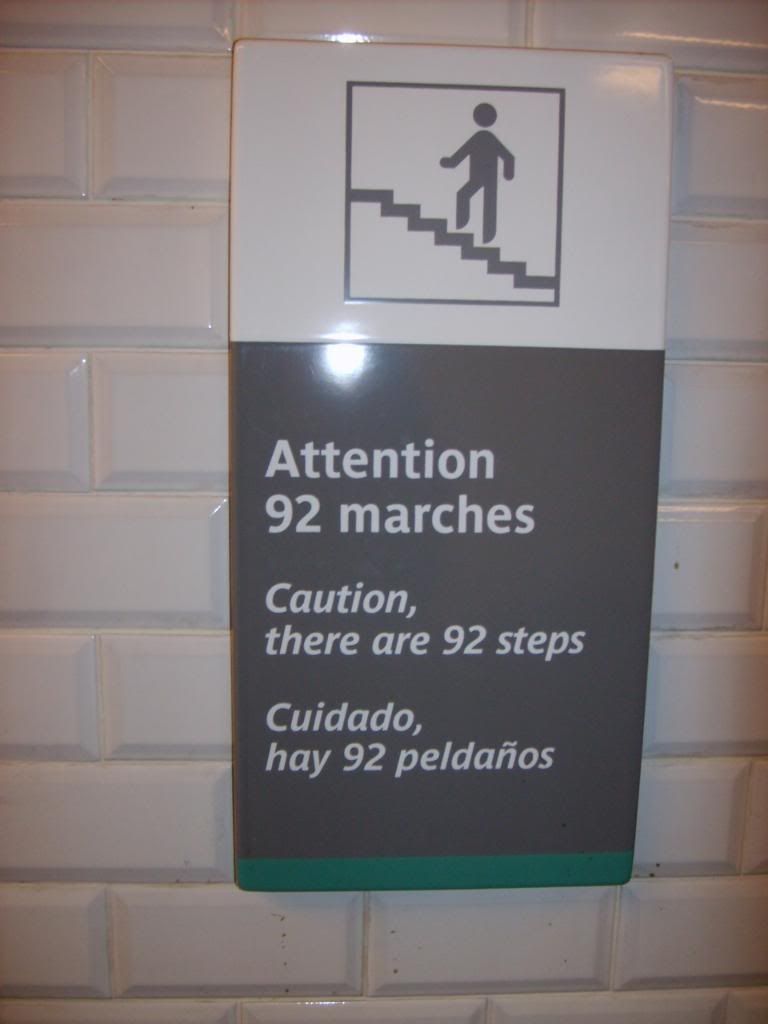
Except that this turned out to be Caulaincourt, not Abbesses; I’d gotten off 1 stop too soon. I spent upwards of 6 minutes wandering about and ended up getting back on the train and arriving only 6 minutes early for my appointment, which is more or less my equivalent of running late (actually running late is cause to doubt the integrity of the time-space continuum).
Anyway, I got pictures of the paintings on the up staircase, which (according to Wednesday’s student tour leader peoples) were painted by some of the people who have stuff at Place de Tertes.
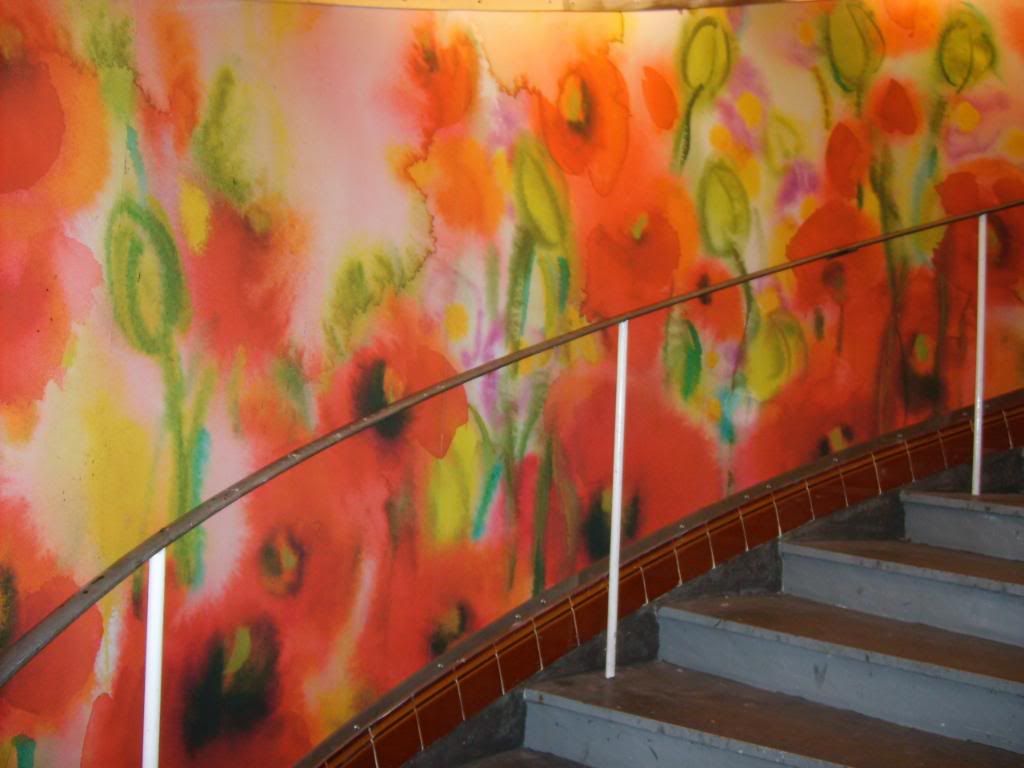
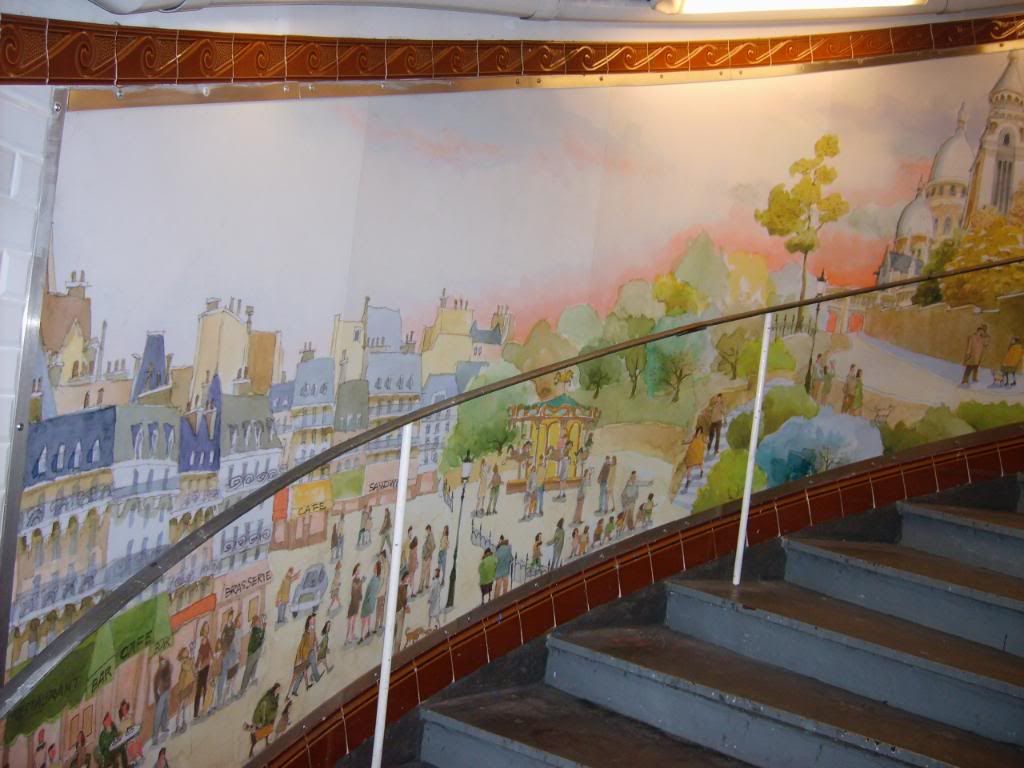
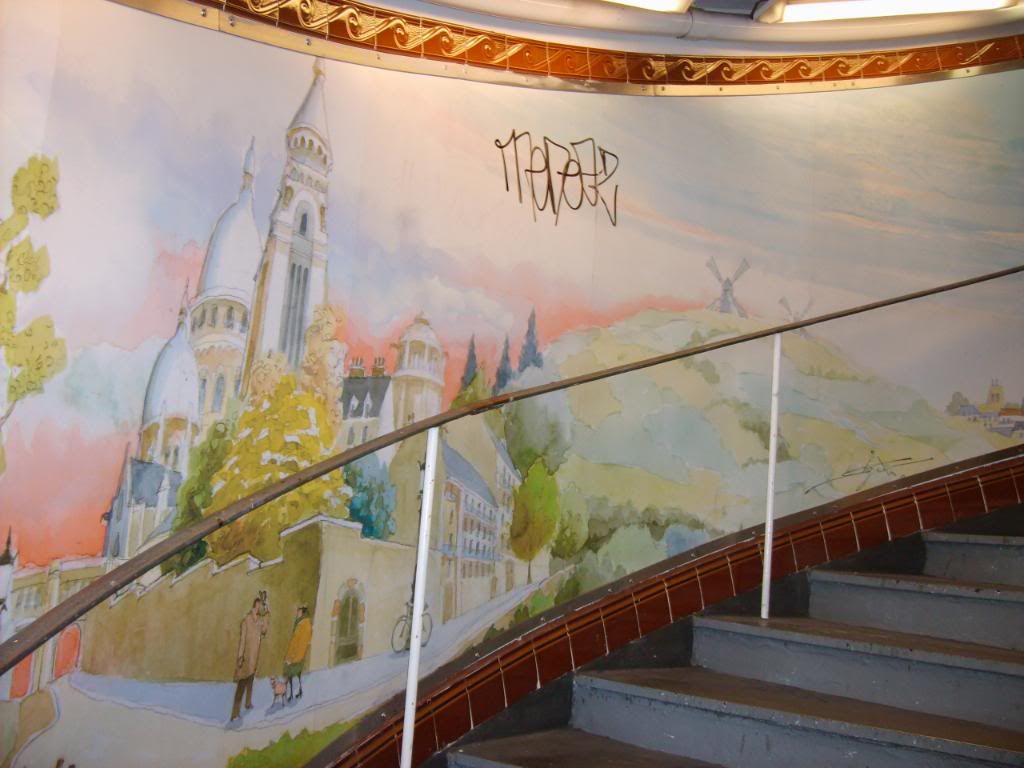
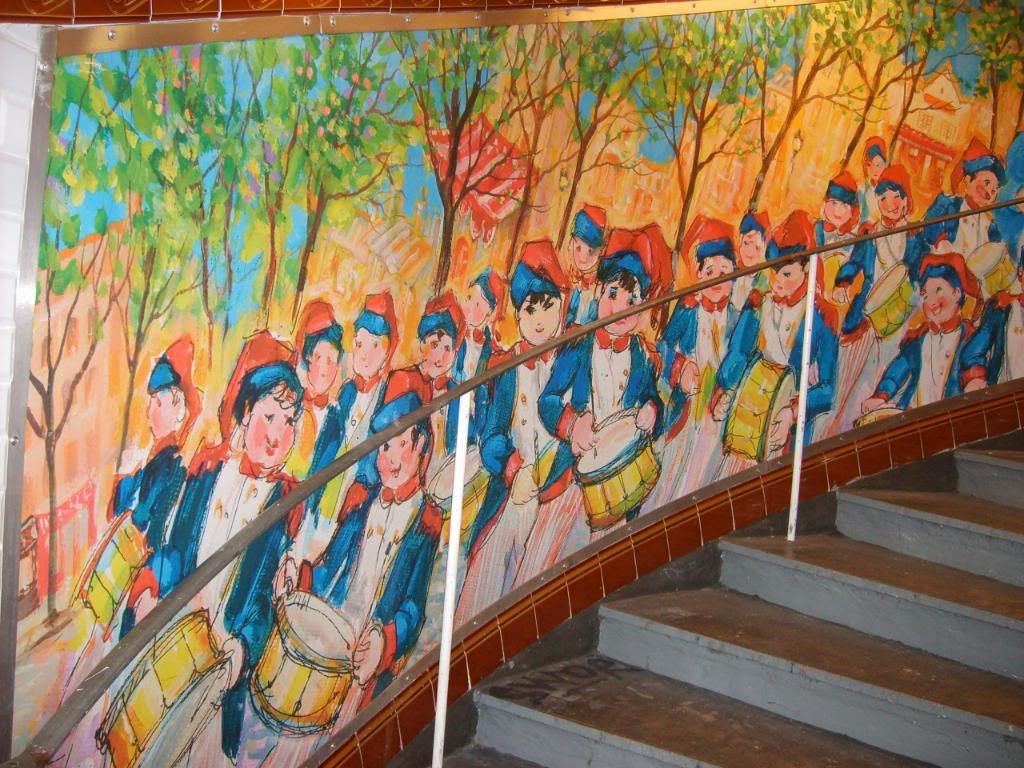

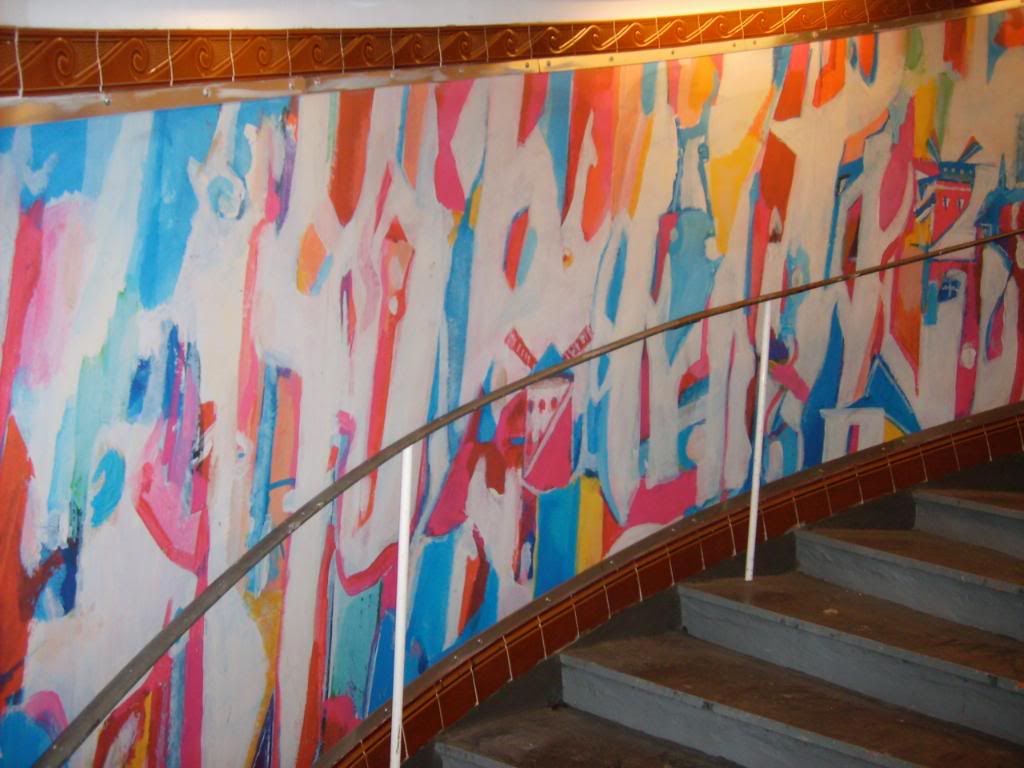



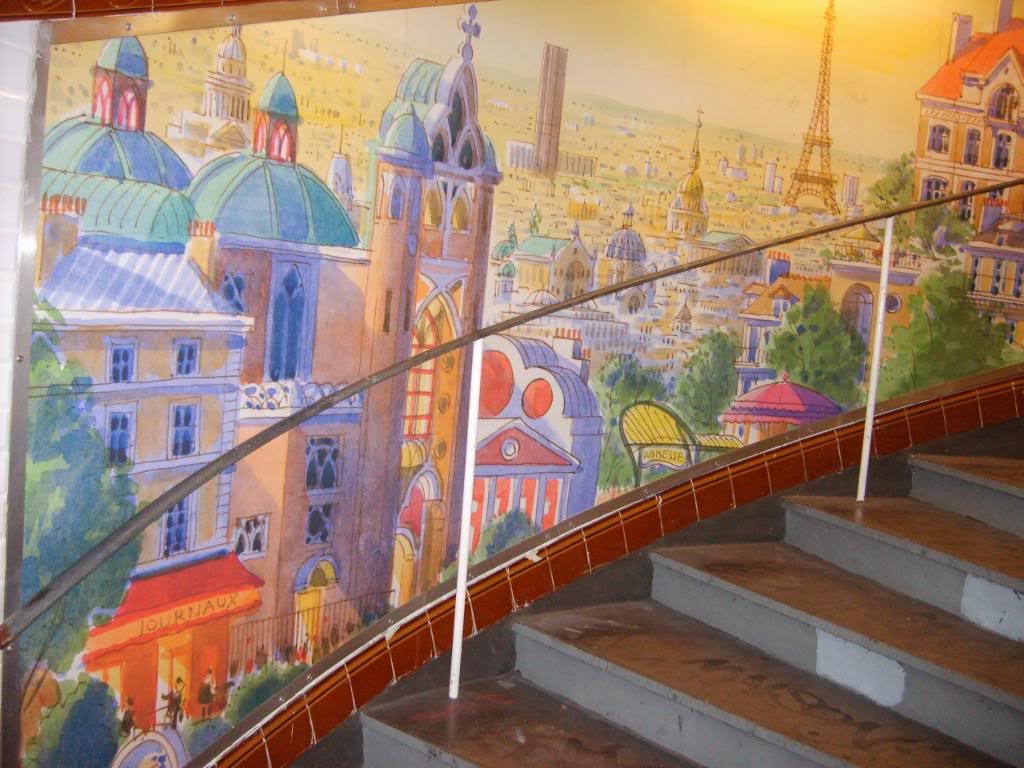
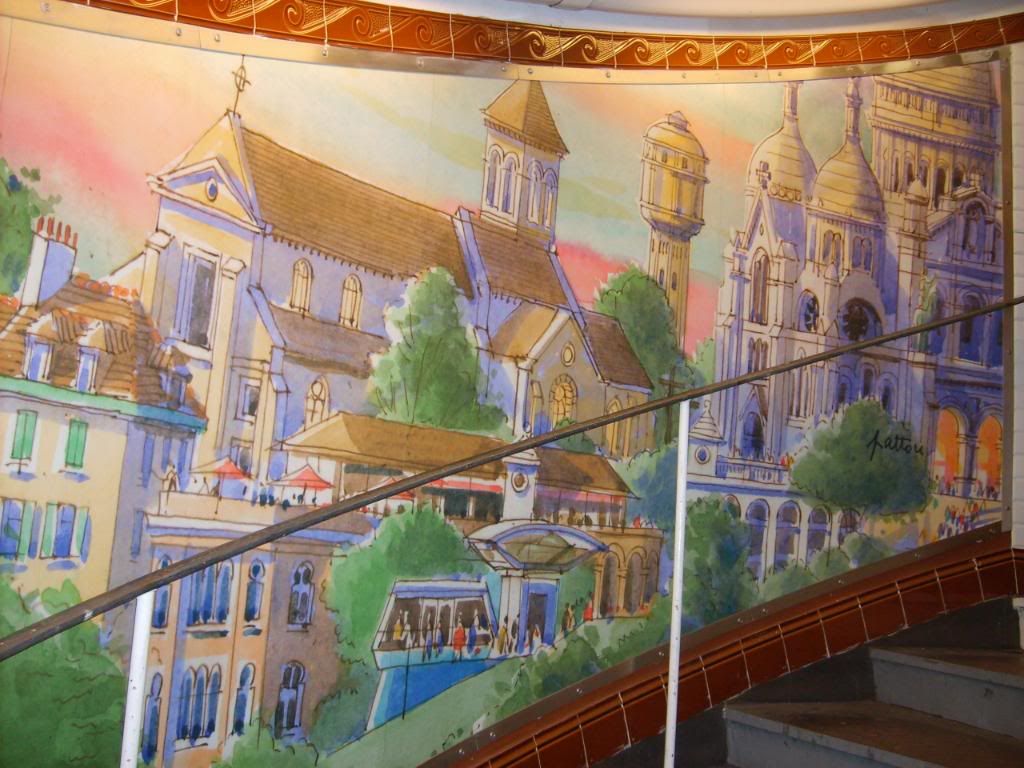
Okay, so I cheated. I didn’t photograph all of the first bit, the red flowers, and I omitted the last bit entirely, because it was just a field of yellow flowers that is absolutely as thrilling to look at as the red flowers. If you really want to get the full experience, just copy the red-flower one into Photoshop or iPhoto or whatever and fiddle with the color adjustment.
And going down, photos! I only took pictures of the least boring ones, because the whole picture-taking thing was getting old:
So that’s that.
In other news, my bathtub drain decided to show its solidarity with the students, professors, prison guards, etc, by going on strike a few days ago. Thus I got to have lots of fun unclogging it, which was a wonderful learning experience in a can-do DIY ethic.

The high-tech tools of self-administered plumbery: a plastic butter knife and a wire hanger. Also featured: your friendly neighborhood bidet. I believe the bidet was invented when a French plumber got high and decided that what the world really needed was a bathtub the size of a sink that looks like a toilet. It’s sort of plumbing’s answer to the duck-billed platypus. It’s also a handy place to store random items in a little dorm bathroom that has no cabinet.
Because the hanger was one of the ones with a cardboard tube, I felt compelled to ripe said tube in half, peel away the layers, and turn them into a lovely pseudo-floral thingy:

This is what us hard-working Honors College kids do when we should be working on our Comprehension and Analysis of Texts essays.
I’d taken a picture of a synagogue today, first one I’ve come across in Paris, but I don’t seem to have uploaded it. It was in the 17th, I believe, an area with a vaguely Upper-West-Side feel. Quite charming. I noted it mainly because it said above the door “Aime ton prochain comme toi-même,” which I assume is the standard French version of “Love thy neighbor as thyself.” Notable in the slightly different wording; prochain is, literally, next, and I think though I may be wrong that it feels slightly closer than neighbor, given that neighbor basically means “closest entity still separate from the most basic group” (e.g. the person in the next apartment over, not in your own apartment; or the country that shares a border with yours, not your own country), whilc prochain comes from proche, French for close. Also, I just can’t get used to the use of tu and toi as anything other than familial or familiar/condescending. Thee and thou are just so archaic in English that they come off as formal, since they’re only ever used when quoting or blatantly alluding to something (“Thou shalt not [verb phrase].” “Shall I [verb] thee to a [noun]’s [noun]?”). You don’t get this with the French equivalents. So to anglophone ears, you end up with this jarring combination of Divine Pronouncements on Stuff To Do, and Pronouns You Use With Friends And Family. It’s kinda weird. To me, at least.
Personally, I think the different levels of pronouns are more or less a waste of time. They’re really only useful for establishing/reinforcing various forms of social status, and French society is already too obsessed with status. And yes, when I say “French society” I mean “the French educational system,” which is irritating me right now. They’re not as bad as, say, medieval Japan; they place only slightly more emphasis on hierarchy than your average military chain of command. The trouble, I think, is in the self-styled meritocracy of it all. The French put way too much stock in their precious exams. I’m sure there’s more to becoming a teacher in France than passing one test, but that does seem to be a big focus of the process. Of course, standardizing testing that way means that, at least, all public-school teachers will be relatively similar in their approaches. It’s the same flaw you get with a lot of standardization: one way that works becomes The Way That Works. Not that all my French professors’ pedagogical styles have been completely interchangeable, but there’s definitely a French style of teaching that’s far more pronounced than any “American style” I’ve encountered at Hunter. Authority is very top-down. I’m not even sure if they have the students do evaluations at the end of the semester. Honestly, I wouldn’t be all that surprised if they didn’t. And professors seem to consider class time their own personal fiefdoms, essentially. My grammar professor likes to rant about her own sociopolitical views as if they were established fact. I tend to agree with her on more things than not, but it’s still rather annoying. I’m there, after all, to relearn how put together sentences in French, not to hear some random teacher’s opinions on swine flu or the Bodies exhibit. French professors are there to pass down knowledge to the next generation; their authority is derived not from their ability to answer to the students’ needs, but from their having passed whatever fancy exam and studied their subjects extensively. I swear they’re this close to claiming the Mandate of Heaven. Of course, knowing your subject and being passionate about it (which they tend to be) are good starts, but they only go so far.
Really, I think France and the US basically invert the prestige of one another’s educational and medical systems. American doctors get a very pragmatic sort of prestige: they operate in a very capitalist environment where their services are essential, thus they make lots of money (and, implicitly, face tough competition in order to make more money than their peers). French teachers get a much more symbolic prestige — the whole We Are Keepers Of Knowledge shtick — operating in what seems to be a practical government monopoly. Symbolic prestige, I think, gives people more of an attitude problem.
It’s telling that, whenever you hear talk about the bit of Sarkozy’s so-heavily-contested reforms that would make universities more independent of one another, all you hear about are the drawbacks or the benefits of competition. Either it’s teachers lamenting that a disparity in quality would arise between rich schools and poor schools, or it’s the pro-reform types proclaiming that competition will encourage each school to do better. Never is the possibility of variety really brought up. It seems that in the French mind, the quality “good” in an education is rather like the quality “does not blow up upon ignition” in a car; you might do it better or worse than someone else, but you’re all trying for the same thing. For the French, “variety” in schools means that some specialize in sciences, some in humanities, some in medicine or law.
Yeah, you know, I didn’t actually start this post intending to go on a rant against French professors. Really, they’re basically well-meaning people and they do know their subjects and I have nothing against them personally. Their general style can even be quite entertaining. It’s just getting tiring, especially because the strike has basically polarized people into pro or con and rendered the professors quite defensive about their precious prestigious employee-of-the-state-with-automatic-tenure status. American professors don’t seem to identify quite so much with professor-ness or teaching in general; their identity seems more related to their particular subject. They’re linguists, writers, physicists, activists, researchers, so on. Again, I blame the French Revolution. Since they weren’t forced right off the bat to deal with the competing interests of 13 separate political entities, the French basically replaced one System To Authoritatively Decide What Should Be Done with another such system. A more rational-legal one to be sure, and one that settled down into a pretty decent exercise in democracy once they got done with the revolutions. But they never seem to have caught on to the idea that there might exist multiple, equally valid answers to a given question. Thus you get stuff like the headscarves-in-public-schools freak-out a few years ago, which is just silly. You get some Americans like that too, of course, who are way too invested in their own ideas of a certain Americanness, but it’s less pronounced.
